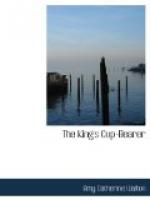Nor were the musical people the only ones who showed their joy that happy day. For, as the priests offered great sacrifices, the rejoicing was both universal and tremendous. ’For God had made them rejoice with great joy.’ Not the men alone, but the wives and the children, so that
‘The joy of Jerusalem was heard even afar off.’
Women’s tears, how often we read of them in the Bible! Rachel weeps over her children and will not be comforted, Hagar lifts up her voice and weeps over her son, Naomi weeps as she comes back to her desolate home, Hannah weeps as she kneels in the tabernacle court, the widow weeps as she follows her only son to the grave, and the company of women weep as Jesus of Nazareth is led out to the cross.
So many women’s tears, so very few women’s smiles; so much mourning and lamentation, so very little happiness and rejoicing. But, on this day of dedication, the wives were as merry and glad as the husbands, and even the children took part in the general joy.
It is interesting to notice that the Book of Psalms was the national song-book of the Jewish nation, a large number of the Psalms having been composed for special occasions, in order to commemorate certain memorable days in the history of the nation.
One Psalm, namely Psalm cxlvii., was probably composed in the time of Nehemiah, in order that it might be sung at the dedication of the walls.
Ver. 1: ’Praise ye the Lord: for it is good to sing praises unto our God; for it is pleasant; and praise is comely.
Ver. 2: ’The Lord doth build up Jerusalem: He gathereth together the outcasts of Israel.’
Ver. 12: ’Praise the Lord, O Jerusalem; praise thy God, O Zion.
Ver. 13: ’For He hath strengthened the bars of thy gates; He hath blessed thy children within thee.’
There follows in the Psalm a curious mention of snow and ice. The dedication of the city took place late in the year, and probably Jerusalem was white with snow as the singers in their white robes went round the walls, the snow being a glorious emblem of the purification which had just taken place. White as snow,—white in the blood.
Vers. 16-18: ’He giveth snow like wool: He scattereth the hoar frost like ashes. He casteth forth His ice like morsels: who can stand before His cold? He sendeth out His word, and melteth them. He causeth His wind to blow, and the waters flow.’
Surely as the people rejoiced on the day that the city was finished, they must have remembered the words of old Daniel the prophet, written whilst they were in captivity, a hundred years before this time.
For what had Daniel declared? He had foretold that his nation should return from captivity, and that Jerusalem should be restored.
’The street shalt be built again, and the wall, even in troublous times.’
Nehemiah’s work was evidently revealed to Daniel, and he was also told something about Sanballat, and Tobiah, and the other troublers of the Jews.




